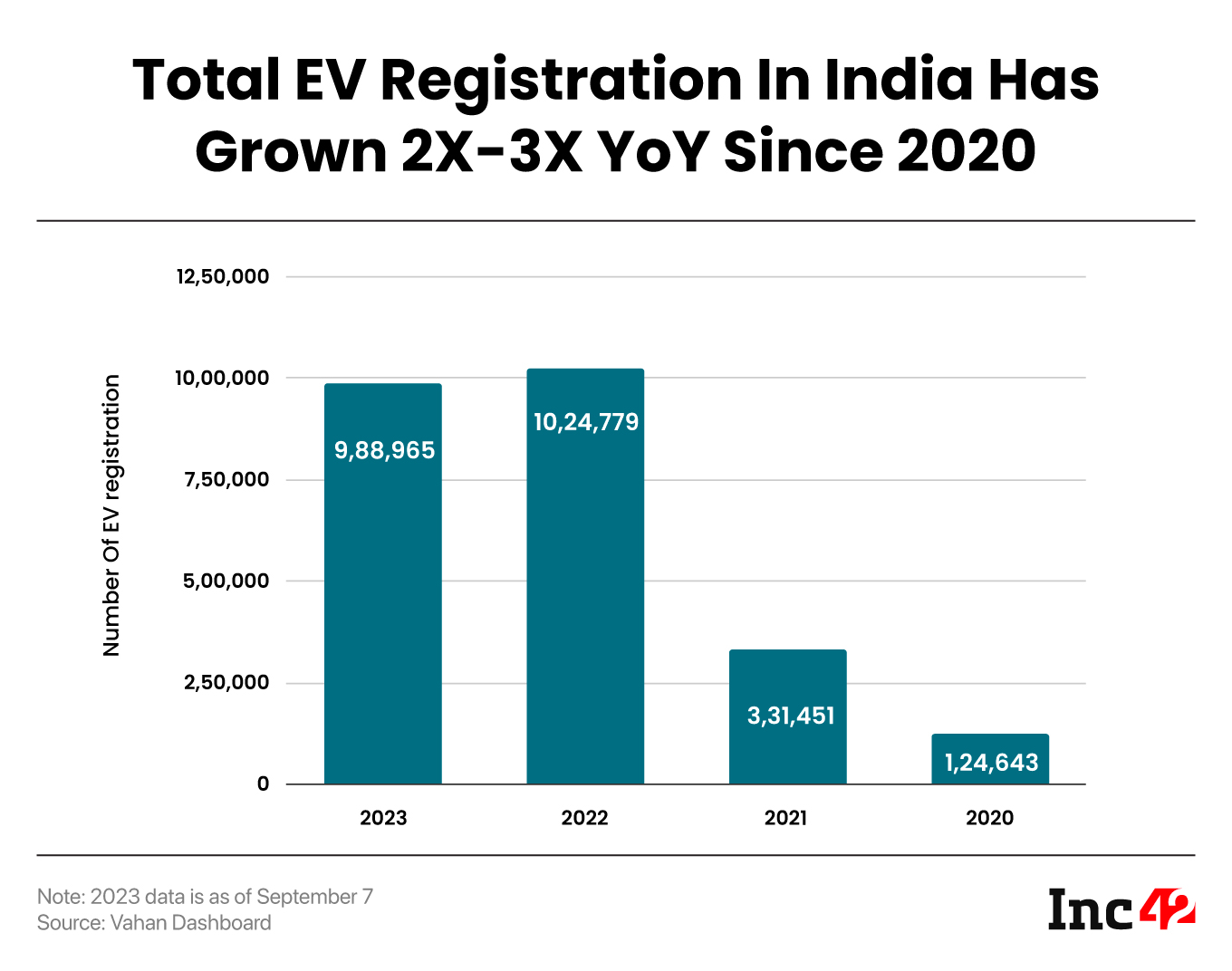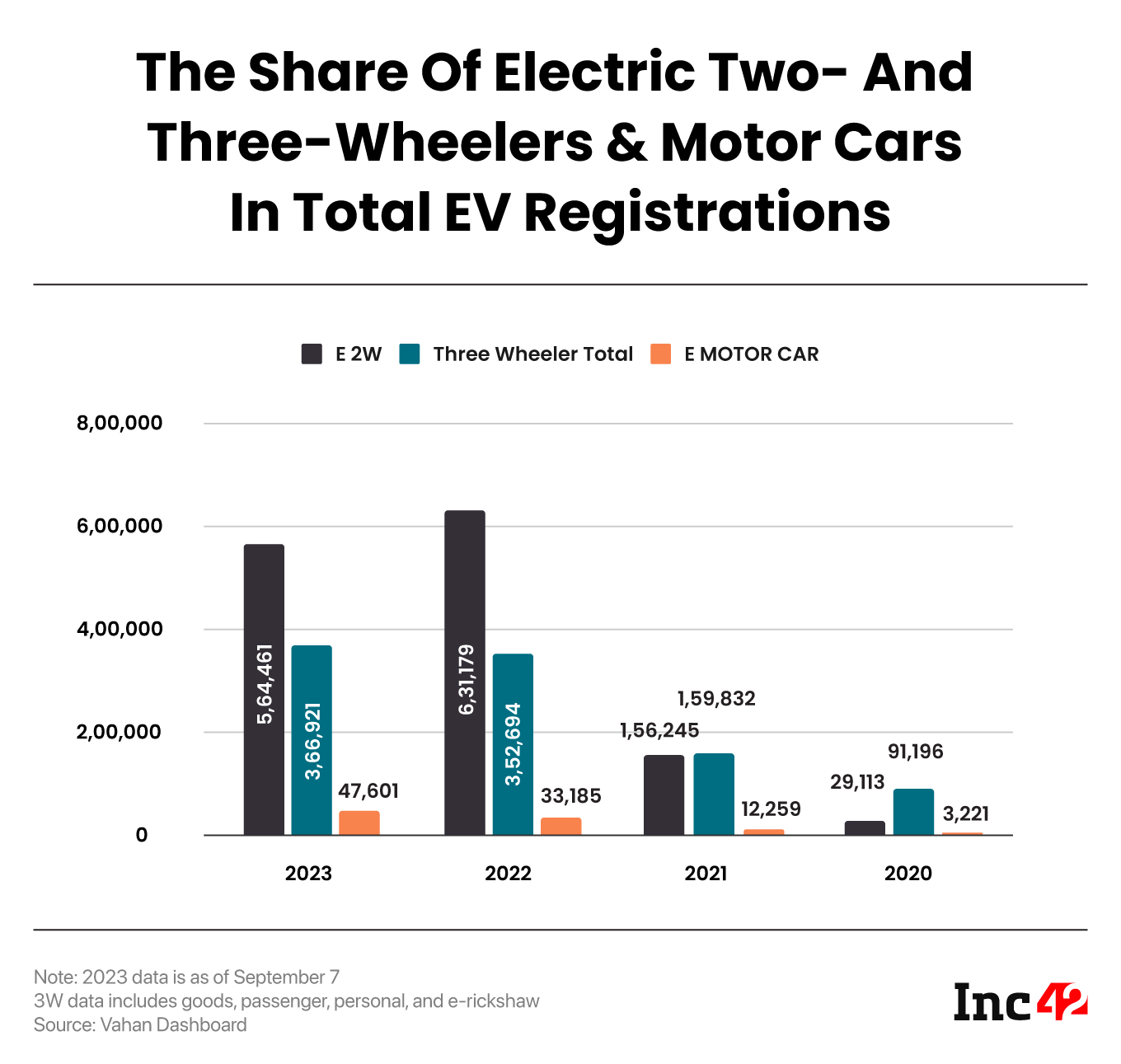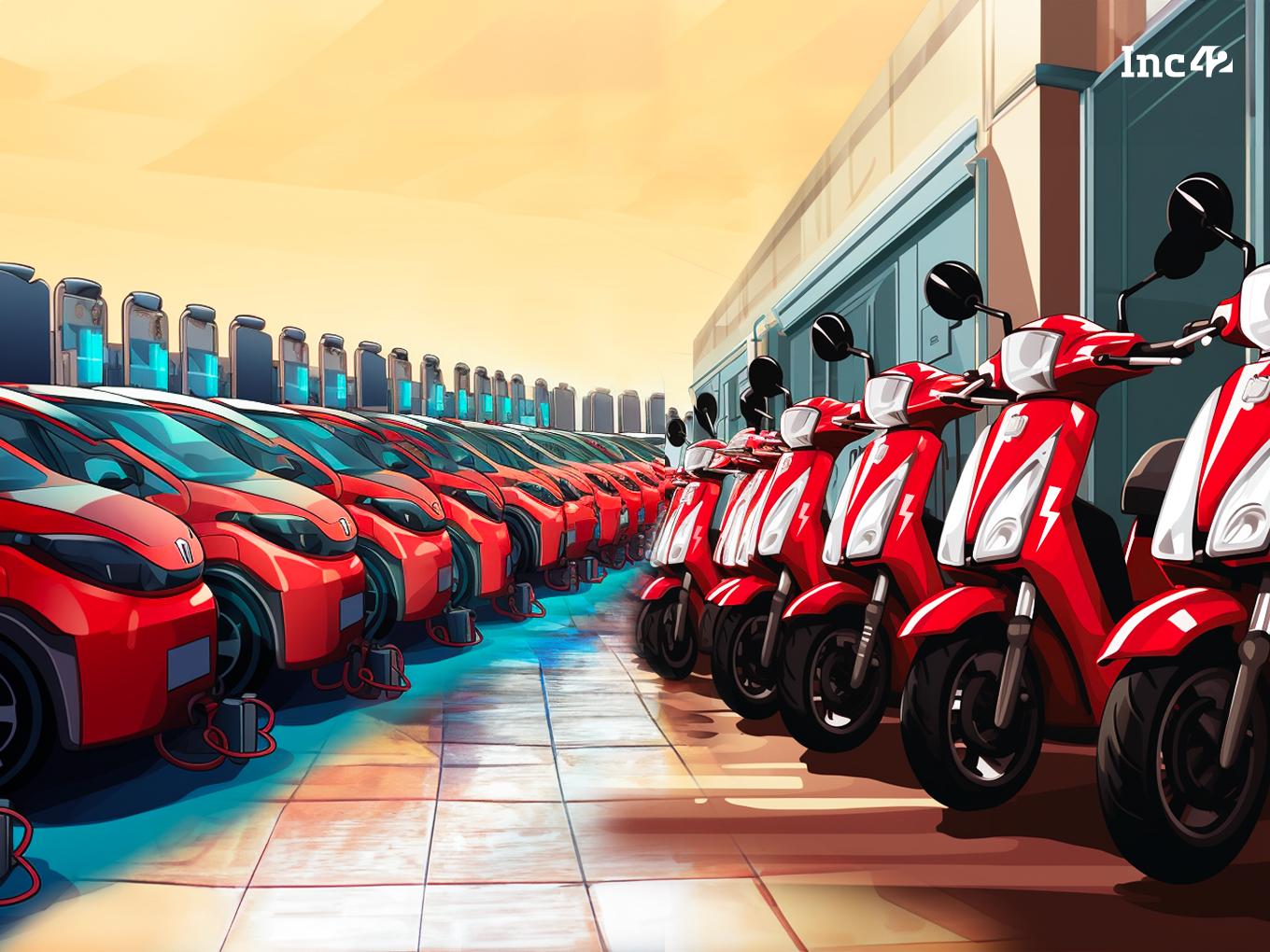While the number of EV registrations in India stood at 1.25 Lakh units in 2020, this number surged to 10.25 Lakh in 2022 and almost 10 Lakh in 2023 so far
Amid challenges like fire and safety incidents, lack of adequate charging infrastructure, policy revamps, among others, EV sales in the country have continued to grow since 2020
With increasing awareness about need for reduction in carbon emission, increase in options and improving charging infra, EV sales in India are expected to reach 1 Cr units annually by 2030
Driven by an increase in awareness towards cutting down carbon emissions, innovation and availability of multiple options, India has witnessed a sharp 700% jump in the number of electric vehicle (EV) registrations since 2020, suggests Vahan data.
In 2020, when India had just about started welcoming and accepting EVs, the sale of such vehicles stood at 1.25 Lakh units. Erickshaw was the most popular category among EVs.
However, this number jumped to 10.25 Lakh units in 2022, as more companies and startups came out with their EV products and customers started adopting the technology. In just over eight months of 2023, the number of EV registrations currently stand at 10 Lakh units.
Despite significant challenges, including fire and other safety incidents related to EVs in India, controversies around the usage of low-quality Chinese batteries, policy revamps, weak charging infrastructure, and the general reluctance of buyers to adopt EVs, the its sales of EVs have grown by 2X-3X year-on-year (YoY) in India since 2020.

EV sales currently account for a little over 6% of the total vehicle registrations in the country this year across petrol, diesel, CNG and other fuels. While the EV share is still significantly low in the automotive market, this is an increase from a mere 0.7% market share in the year 2020.
Besides, we must note that there has also been a major trend shift in the EV market after 2020. From 2021, sales of electric two-wheelers started taking the dominant position in the EV market as compared to erickshaws earlier.
Meanwhile, there has also been a sudden uptick in the sale of commercial electric three-wheelers and autos. So far in 2023, electric three-wheelers have seen total vehicle registrations of around 3.7 Lakh units while the number stands at 5.6 Lakh units for two-wheelers.

As per the government’s latest data, the total number of EVs in India till August 3 this year stood at 28.3 Lakh units across the country, excluding Telangana and Lakshadweep.
It is pertinent to note that in March this year, Minister of State (MoS) for Heavy Industries Krishan Pal Gurjar said India was home to 21.7 Lakh registered EVs. Despite a few dips in the months of April and June, the month-on-month (MoM) increase in EV sales has also been momentous this year.
Tackling The Challenges Head On
During the summer of last year, a number of EV fire incidents grabbed the headlines one after the other. Ola Electric, Okinawa Autotech, Pure EV, and some other less-selling escooter companies got caught in controversies following those incidents.
As the number of fire incidents started increasing, some of them even claiming lives, several manufacturers came under the probe initiated by the Indian government to find out the reason behind the fires.
The probe found that EV batteries and battery management system (BMS) lacked certain basic safety features or were of inferior quality.
Soon after, the government tightened the battery testing norms, with the Ministry of Road Transport and Highways mandating the amended AIS 156 and AIS 038 Rev.2 standards for different EV categories.
While the battery safety standards started receiving increased attention, the Ministry of Heavy Industries (MHI) started taking a close look at domestic value addition by EV original equipment manufacturers (OEMs) in the second half of last year.
It also came to the fore that EV OEMs, particularly in the two-wheeler space, were using a substantial amount of Chinese components in their vehicles.
A dozen electric two-wheeler manufacturers, including Hero Electric, Okinawa Autotech, Revolt, and Ampere, among others, came under the government’s scanner for allegedly claiming FAME-II subsidies without adhering to the minimum localisation norms.
Amid this, the government held back the release of some FAME-II subsidies. This resulted in EV sales taking a hit. Given that two-wheelers currently drive the EV market, total EV sales also slumped for a few months. For instance, the total number of EV registrations in November 2022 was at a record high of 1.22 Lakh units. In January this year, it fell to 1.03 Lakh units.
While sales just about began seeing an uptick after that, the government took a number of other measures for violation of FAME-II norms which again hit two-wheeler sales.
The MHI put an embargo on some of the manufacturers from listing their sales on the official National Automotive Board (NAB) portal and began penalising the OEMs. The central government issued notices to return the subsidy amounts that the government has passed on to the OEMs found guilty of violating norms.
On the other hand, Ola Electric, Ather Energy, TVS Motor, and Hero Motocorp came under a fresh probe for allegedly selling their chargers and proprietary software separately at an added price to keep the vehicle prices under the INR 1.5 Lakh cap to avail the FAME-II scheme.
Amid all this, total EV registrations again dipped to 1.02 Lakh units in June after a record 1.58 Lakh registrations in May.
Two-wheeler vehicle registrations dipped to almost a 12-month low of 46,034 units in June, hurt by the government’s decision to cut subsidy benefits under FAME-II and the OEMs’ decision to raise vehicle prices.
After finding many two-wheeler OEMs flouting FAME-II norms, the Centre cut the incentives to 15% of the ex-factory price of electric two-wheelers from 40% earlier. It also cut the demand incentive to INR 10,000/kWh from INR 15,000/kWh.
Under the FAME-II scheme, the government aimed to support the electrification of public and shared transportation through demand incentives for 7,090 ebuses, 5 Lakh electric three-wheelers, 55,000 electric four-wheeler passenger cars, and 10 Lakh electric two-wheelers.
As per the government’s latest data, a total of 8.47 Lakh electric vehicles have been sold by EV manufacturers to consumers under the FAME-II scheme, as on July 28, 2023. Of this, 7.53 Lakh units were two-wheelers.
In the Economic Survey 2022-23, the government projected the domestic EV market to grow at a compound annual growth rate (CAGR) of 49% between 2022 and 2030 to hit 1 Cr units in annual sales by 2030.
While policy revamps to tighten the loopholes have created some major lag in EV sales, improvement in charging infra, battery and vehicle technology, and easier access to finance will play a crucial role in driving up EV sales in the country going ahead.
































 Ad-lite browsing experience
Ad-lite browsing experience